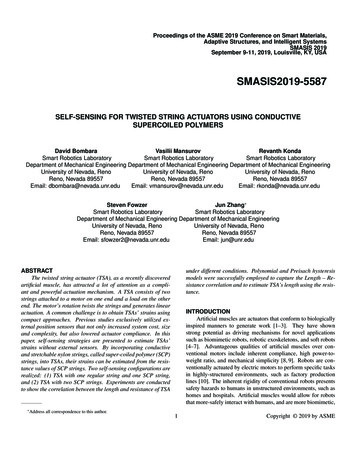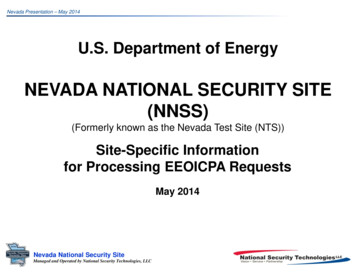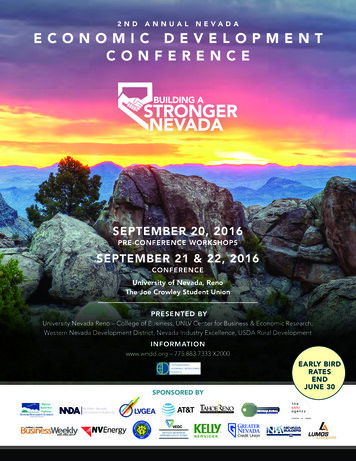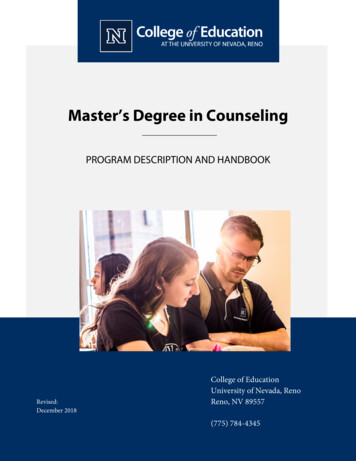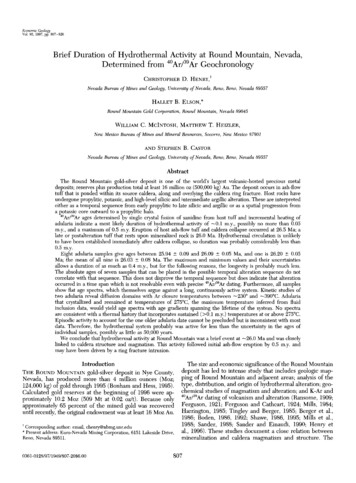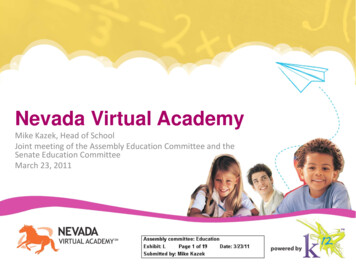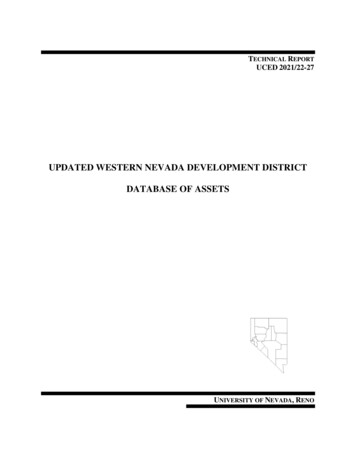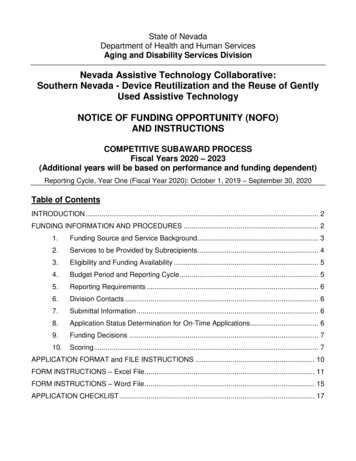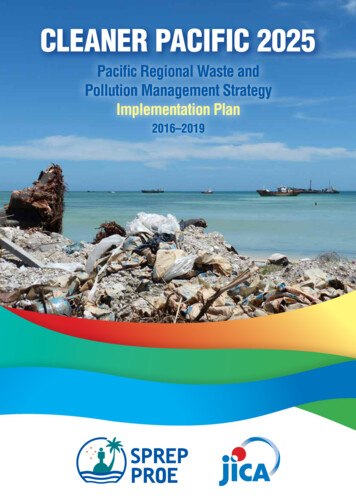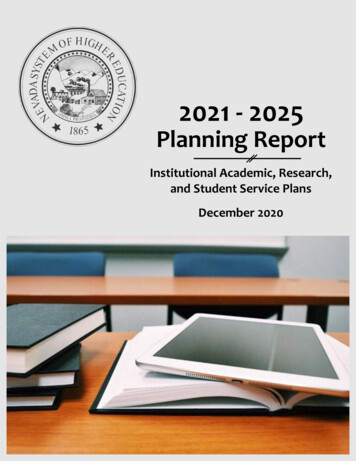
Transcription
2021 - 2025Planning ReportInstitutional Academic, Research,and Student Service PlansDecember 2020
NSHE LeadershipBoard of RegentsDr. Mark W. Doubrava, ChairMrs. Carol Del Carlo, Vice ChairDr. Patrick R. CarterMs. Amy J. CarvalhoDr. Jason GeddesMr. Trevor HayesMs. Lisa C. LevineMrs. Cathy McAdooMr. Donald Sylvantee McMichael Sr.Mr. Kevin PageMr. John T. MoranMs. Laura E. PerkinsMr. Rick TrachokMr. Dean J. Gould, Chief of Staff andSpecial Counsel to the Board of RegentsOfficers of the Nevada System of Higher EducationDr. Melody Rose, ChancellorDr. Keith Whitfield, PresidentMr. Brian Sandoval, PresidentUniversity of Nevada, Las VegasUniversity of Nevada, RenoMr. Bart J. Patterson, PresidentDr. Federico Zaragoza, PresidentNevada State CollegeCollege of Southern NevadaMs. Joyce M. Helens, PresidentDr. Karin M. Hilgersom, PresidentGreat Basin CollegeTruckee Meadows Community CollegeDr. Vincent R. Solis, PresidentDr. Kumud Acharya, PresidentWestern Nevada CollegeDesert Research Institute12021-2025 Planning Report
Table of ContentsIntroduction3University of Nevada, Las Vegas4University of Nevada, Reno17Nevada State College28College of Southern Nevada34Great Basin College43Truckee Meadows Community College47Western Nevada College55Desert Research Institute5922021-2025 Planning Report
INTRODUCTIONThe Nevada State Legislature mandates that public higher education institutions compile a comprehensivereport on program plans. Therefore, this report is prepared in accordance with state law requiring theNevada System of Higher Education (NSHE) to prepare a biennial report for submission to the NevadaState Legislature that outlines plans for new programs and expansions of existing programs of instruction,public service and research. Specifically, Nevada Revised Statutes 396.505 provides the following:1. The Board of Regents shall prepare a comprehensive plan for the next 4 years which explains:(a) Any anticipated new programs and expansions of existing programs of instruction,public service or research, itemized by year and by purpose;(b) The anticipated cost of each new or expanded program described under paragraph (a);(c) The amount and source of any money anticipated to be available, from sources other thanlegislative appropriation, to meet each item of anticipated cost listed pursuant toparagraph (b); and(d) Any further information concerning its comprehensive planning which the Board of Regentsmay deem appropriate.2. The Board of Regents shall biennially bring the plan up to date for the ensuing 4 years, and shallpresent the revised plan to the Legislature not later than February 1 of eachodd-numbered year.This report summarizes the institutions’ academic and research plans, also in accordance with Boardpolicy (Title 4, Chapter 14, Section 3.3 of the Handbook). These plans must be viewed in the context of aninstitution’s overall budget and fiscal capacity, as well as demand for the program. In some cases, the plansmay include academic programs that are being discussed or considered for the future, but they may notultimately be brought forward for approval for a variety of reasons. However, they are included in thereport as an indication of what may come forward within the next four years. Many of the anticipatedprograms are projected to be funded with federal grants, making some programs more likely than othersto begin in times of limited state resources. To that end, these lists may be viewed as “wish lists” based onresource availability.Because this report is updated and published every two years, it is often the case that institutions mayhave programs on the list from several years back and continue to roll them forward in the hope thateventually resources will be available to develop such programs. The plans are intended to notify variousconstituencies, including the Board of Regents and the Legislature, of what institutions are hoping todevelop and believe is needed for them to meet their mission and the needs of the state, but they shouldnot be construed as definitive in terms of the date of implementation.The current NSHE Strategic Goals can be accessed here.32021-2025 Planning Report
UNIVERSITY OF NEVADA, LAS VEGASOverviewThe University of Nevada, Las Vegas (UNLV) is a public research institution committed to excellenceand impact in teaching, research, and public service. UNLV is recognized by the CarnegieFoundation for its very high research activity as well as for its community engagement. Throughprogressive curricular offerings, cutting-edge interdisciplinary scholarship, and cooperativeengagement with its local and extended communities, the university seeks to create, disseminate,and apply knowledge for the improvement of society—and to prepare a new generation of citizensand leaders who are equipped with the knowledge and skills to fortify the workforce and lead livesof impact in the world.Accredited by the Northwest Commission on Colleges and Universities (NWCCU), UNLV attracts topstudents and faculty, educates a diversifying population and workforce, and drives economicactivity through innovation, research, and community partnerships. The university has the onlySchool of Law and School of Dental Medicine in Nevada, and is a charter member of the MountainWest Conference, a collegiate athletic conference affiliated with the National Collegiate AthleticAssociation (NCAA).With 69% of its degree-seeking undergraduate students identifying as part of a racial or ethnicminority, UNLV is one of the nation’s most diverse institutions. The university meets federalMinority-Serving Institution (MSI) requirements as an Asian American, Native American, and PacificIslander-Serving Institution (AANAPISI), and as a Hispanic-Serving Institution (HSI).Strategic ObjectivesIn 2018, UNLV was awarded R1 status for “very high research activity” by the Carnegie Classificationof Institutions of Higher Education. Of approximately 4,000 institutions nationwide, UNLV now isone of approximately 130 with this distinction. In addition, UNLV holds the Carnegie Foundation’snational elective community engagement classification. Both designations are the gold standard foruniversity metrics. These accomplishments were central goals of the Top Tier Strategic Plan, whichenvisions that UNLV will become one of the nation’s premier public universities in education,42021-2025 Planning Report
2021 - 2025 Planning Reportresearch, and community impact by 2025.The university’s mission states: “UNLV’s diverse faculty, students, staff, and alumni promotecommunity well-being and individual achievement through education, research, scholarship,creative activities, and clinical services. We stimulate economic development and diversification,foster a climate of innovation, promote health, and enrich the cultural vitality of the communitiesthat we serve.”UNLV recognizes the importance of infrastructure and shared governance in all aspects of itsoperations and activities. A strong infrastructure and a healthy model of shared governance modelare essential to the university’s four core themes and their associated priorities:Student Achievement – Students come to UNLV with the expectation that the time they spendwith us will help improve their life after they leave. We will continually demonstrate that we valuestudents and consider their success our mission. Our priorities are to: Ensure the quality of learning experiences and support services–especially academicadvising and peer mentoring–as we recruit, retain, and graduate a diverse student body.Be an institution of opportunity where members of groups who are traditionallyunderrepresented in higher education can receive the support they need to achieve theireducational and professional goals.Grow capacity for degrees that address high-need areas within the workforce.Research, Scholarship, and Creative Activity – Research, scholarship, and creative activity arecentral to our mission, and we will provide comprehensive support for the work of the researchersand students who have joined UNLV to make significant contributions to their fields of inquiry. Ourpriorities are to: Pursue research, scholarship, and creative activities with high impact.Promote opportunities for economic development and technology transfer.Develop innovative graduate and professional programs.Seek opportunities for external funding and support.Support the research and grant-writing efforts of non-faculty researchers andpostdoctoral scholars.Academic Health Center – Healthcare delivery and services are a critical need for our region. We willwork to establish an integrated Academic Health Center for Southern Nevada. Our priorities are to: Ensure that our clinical practices are able to continue serving the general community.Support the path for the School of Medicine to attain full accreditation and producegraduates.Establish close partnerships among our various health-related educational units.Continue to articulate the critical importance of healthcare and value of services to obtainfunding and resources from a variety of sources.Community Partnerships – UNLV has long been a key player in the economic, social, and culturaldevelopment of our region. Because we receive direct support from the state, our communitycontinues to rely upon us to develop productive partnerships and collaborations that affirm itsongoing investment in our work. Our priorities are to: 5Demonstrate the value of the university as we collaborate and engage with ourcommunity to provide expertise, service, and support.2021-2025 Planning Report
2021-2025 Planning Report Help economic development and recovery efforts in our region by connecting businesswith needed resources.Provide support for our outward-facing areas such as Athletics, Thomas & Mack,Performing Arts, as they provide programming that is beneficial for our community.Maintain our donor and alumni support.Academic ProgramsUNLV’s academic programs are designed to deliver high-quality instruction and support the successof the nearly 26,000 undergraduate, 4,300 graduate, and 1,000 professional students who areenrolled at the university. These programs undergo a rigorous process of development beforeadoption, continuous curriculum improvement through program review, academic assessment forboth courses and degrees, evaluation through the graduating senior exit survey, and additionalreviews for the university’s regional and discipline-specific accreditation processes. In addition tothese programs, the university offers a variety of academic support services intended to promotestudent retention, timely progression to graduation, and other measures of student success.The university is home to 12 diverse colleges and schools that award undergraduate and graduatedegrees and certificates; 3 professional schools in the areas of dental medicine, law, and medicine;an Honors College that offers university and unit-based programming along with associated degreedesignations; an academic library spread across multiple (including discipline-specific) branches;and a center for academic success that provides supplemental instruction and coaching along withservices for students with undeclared majors. Academic Success CenterBusiness School, LeeDental Medicine, School ofEducation, College ofEngineering, Howard R. Hughes College ofFine Arts, College ofGraduate CollegeHonors CollegeHospitality, William F. Harrah College ofIntegrated Health Sciences, School ofLaw, William S. Boyd School ofLiberal Arts, College ofLibraries, UNLVMedicine, UNLV School ofNursing, School ofPublic Health, School ofSciences, College ofUrban Affairs, Greenspun College ofAs of fall 2019, UNLV’s academic offerings included 84 bachelor’s degree programs, 4undergraduate certificates, 69 master’s degree programs, 42 graduate certificates, 2 specialistprograms, 41 research doctoral programs, and 4 professional doctoral programs.UNLV faculty constantly monitor academic trends and the labor market, and revise the curriculumof existing degree programs, or design new programs to meet the educational and workforcedemands of students and employers. For instance, the B.A. in General Studies in Liberal Arts is beingproposed to offer a flexible pathway to graduation for students who do not choose a traditional62021-2025 Planning Report
2021-2025 Planning Reportdegree program in the College of Liberal Arts. Similarly, the B.S. General Science is being designedas a streamlined degree program for non-traditional sciences majors in which rigid coursesequences are replaced with STEM (science, technology, engineering, and mathematics) electivesto increase options for students.Las Vegas continues to attract and support the growth of professional sport teams. Accordingly,the proposed M.Ed. Intercollegiate & Professional Sport Management will address the increasingneed for professionals with a range of management and leadership skills in sports in southernNevada.As another example, the interdisciplinary M.S. in Data Analytics will allow students from a widevariety of academic disciplines to acquire knowledge and skills in database technology,programming, machine learning, data governance, statistical techniques, and the application ofdata analytics in an organizational environment to address specific questions and problems. Thisinnovative degree program fulfills important state needs in the technology sector, and will preparestudents for the jobs of tomorrow. The B.S. in Cyber Security and Ph.D. in Water Resources aresimilar high-need areas for the state, region, and country. The following table provides informationon all of UNLV’s planned academic programs.72021-2025 Planning Report
2021-2025 Planning ReportAcademic ProgramsThe following table summarizes UNLV’s plans for new programs through 2025.UnitNew ProgramName/Expansionof ExistingProgramBrief DescriptionYear ofImplementationEstimatedCostFunding SourcesOutside of StateDollars2023-2024 272,100 inYear 1; 613,800 inYear 2; 683,400 inYear 3.Costs includeadditionalfaculty linesand graduateassistantships.None2021-2022Minimalstartup costsof ca. 500,000, afterwhich theprogram willbecome selfsupporting.All funding will comefrom current School ofDental Medicine selfsupporting fundbalances and/or grantfunding sources. Allfunding will come fromcurrent School ofDental Medicine selfsupporting fundbalances and/or grantfunding sources.2020–21Minimalstartup costsof ca. 850,000, afterwhich theprogram willbecome selfsupporting.All funding will comefrom current Schoolof Dental Medicineself-supporting fundbalances and grantfunding sources.BusinessPh.D. BusinessUNLV’s first doctoral program inbusiness.DentalMedicine8Dental Public Health(DPH) ResidencyProgram12-month certificate program(24 months for part-timeresidents) offered to dentistsplanning careers in DPH witha focus on assessment, policydevelopment, and assurance.The School of DentalMedicine will work closelywith the Schools ofCommunity Health Sciencesand Law to ensure thatadditional training in publichealth law, public healthadministration/management, andenvironmental hazards isincorporated into thecurriculum.M.S./ Ph.D. inBiomaterials ScienceThis program will be open todentists (D.D.S./D.M.D.) orgraduates from a non-U.S.accredited (CODA) dental school,or post-baccalaureate graduateswho seek credentials withinterest in research with a focuson alloplastic and biomaterialssciences. The School of DentalMedicine will collaborate with theUNLV College of Engineering intranslation of bioengineeringprinciples to craniofacial intraoralapplications.2021-2025 Planning Report
2021-2025 Planning ReportNewProgramName/Expansion ofExistingProgramUnitEstimated CostFunding SourcesOutside of StateDollars2022-2023NoneGrants to supportgraduate assistants.There is strongdonor potential tosupport additionalpersonnel and otherresources.This degree will address theincreasing need for professionalswith a range of management andleadership skills in sports insouthern Nevada. The degree willsupport UNLV’s Top Tier CoreThemes 1 (Student Achievement) &4 (Community Partnerships), asLas Vegas continues to attract andsupport the growth of professionalsport teams.2021-2022No additional resourceswill be needed until theprogram has attainedadequate enrollmentgrowth. When thathappens, it is anticipatedthat one additionalfaculty line (i.e., Facultyin Residence) will beneed for Fiscal Year 2023.Differential fees, tosupport part-timeinstruction costs;grants to support agraduate assistantfor the program.A degree to develop artists with uniqueskill sets, such as business,management, and law, who canbecome “creatives” across a widerange of industries.2021-2022NoneNoneThis program will focus on trainingstudents for jobs as healtheducators.2021-2022 400,000NoneM.S. PhysicianAssistantThis program will focus on the trainingof Physician Assistants, which aresorely needed in Nevada.2023-2024 500,000Differential fees.LL.M. in theAmerican LegalSystemA general LL.M. for internationallyeducated attorneys who can takegeneral courses or tracks that mirrorexisting J.D. concentrations.2021-2022Brief DescriptionYear ofImplementationEducationM.S. LearningAnalytics andPsychometricsM.Ed.Intercollegiate &ProfessionalSportManagementThis degree will leverage currentresources and faculty expertise relatedto learning analytics, educationalassessment, and psychometrics.Students will be prepared to collectand interpret real-world educationaldata that do not fit into standardanalytical frameworks. Students will beable to apply their conclusions tocreatively address issues in educationalsettings. Potential fields of studyinclude learning analytics, sportanalytics, and testing/assessmentanalytics (psychometrics).Fine ArtsB.A. CreativePracticeIntegratedHealthScienceB.S. HealthScienceLaw92021-2025 Planning ReportNoneNone
2021-2025 Planning ReportNewProgramName/Expansionof ExistingProgramUnitYear ofImplementationEstimated CostFundingSourcesOutside of StateDollarsThis degree will be marketed to studentswith 90 or more credits who have notgraduated.Fall 2021Approximately 10,000NoneThis is an existing concentration beingelevated to a full degree.Fall 2021Approximately 375,000 per year.None2021-2022Additional PTI funding,two dedicatedassistantships for thefirst four years, andincentives for onlinecourse development.2020-2021None. Resources withinthe College of Sciencesare currently sufficientfor implementation.None2020-2021None. Resourceswithin the College ofSciences are currentlysufficient forimplementation.Grants2022-2023 250,000Brief DescriptionLiberal ArtsB.A. GeneralStudies inLiberal ArtsPh.D.Psychological& BrainSciencesPublic HealthMPHGeneralist(Online)Graduates will have a broad backgroundin the core concepts of public health,including epidemiology, biostatistics,environmental health, and socialbehavioral health.Grants, industrysupport, andphilanthropy.SciencesB.S. GeneralSciencePh.D.BiochemistryThis is a streamlined degree program fornon-traditional sciences majors. Rigidcourse sequences replaced with STEM(science, technology, engineering,math) electives, to increase options andgraduation rates.Biochemistry Ph.D.’s are experts inchemical and physical processes thatoccur within living organisms. Graduatesare prepared to enter professionalcareers in academia, pharmaceuticalresearch, biomedical industry, publichealth, and related S.ExperienceDesign10Undergraduate program that teachesskills for students to enter theworkforce as cyber analysts or in relatedareas.Prepares students for the “experienceeconomy” in which consumers purchase“experiences”.2021-2025 Planning Report2022-2023Three faculty positionsover three years, 400K for facultysalary and benefits.Three MS GRAs fortwo cohorts. If statefunding does notsupport the requiredresources in the shortterm, the participatingColleges will raise thenecessary funds tosupport Gas, and useexisting faculty andPTI resources.Grants, industrysupport, andphilanthropy.Grants, industrysupport, andphilanthropy.
2021-2025 Planning ReportNewProgramName/Expansionof ExistingProgramUnitBrief DescriptionYear ofImplementationEstimated Cost2021-2022Administrative Assistant@ 65K. Four dedicatedgraduate fellowships orassistantships per yearfor the first four years.2022-2023AdministrativeAssistant at ca. 65K. Fourdedicated graduatefellowships orassistantships peryear for the firstfour years.FundingSourcesOutside of StateDollarsInterdisciplinary11Ph.D. MaterialsScience &EngineeringGraduates will have broad background inMaterials Science and Engineering coveringtheoretical design and simulation,experimental development and creation ofnovel materials with unique and tailoredproperties and applications surroundingthese materials. They will be able to findemployment in research institutes,academia, and industry.Ph.D. WaterResourcesGraduates will have broad backgroundin water studies spanning technicalissues of management, reclamation,use, policy, law, and applications. Theywill be able to find employment inresearch institutes, academia, waterdistricts, and industry.2021-2025 Planning ReportGrantsGrants
2021-2025 Planning ReportWorkforce Development EffortsIn today’s rapidly evolving and technology-driven economy, employers are looking for workers whopossess versatile skills along with core knowledge. Therefore, UNLV must equip graduates with thecompetencies to adapt classroom learning to the needs of the modern workplace. The universitycurriculum must provide students with the tools to navigate the new economy and the skills topursue novel, high-reward careers. There must also be strong co-curricular emphasis on careeroutcomes to help students develop the knowledge and skills to thrive in the new economy afterthey leave UNLV, as well as for years into the future.Accordingly, the university developed a Workforce Development Strategic Plan that identifies keypriorities for preparing UNLV’s students for workforce success and career mobility. The keypriorities are: (i) offering diverse degree and certificate programs for the 21st century economy thatare valued by employers and are associated with high-demand occupations in the region, (ii)integrating workforce readiness into all academic programs, and (iii) promoting active studentparticipation in career planning through a lifecycle approach to workforce readiness.A Workforce Development Taskforce was convened to address these key priorities and to establish,implement, and enhance the opportunities for students to engage in high impact practicesassociated with increased career mobility. A report outlining the Taskforce recommendations willbe submitted to the executive leadership in Fall 2020; upon approval, the Taskforce will advance tothe implementation phase of the initiative.Academic Advising and Student Success ProgramsBoth institutional and national data show that academic advising makes a difference in students’persistence and progress toward graduation. Therefore, it is critical that we continue to buildcapacity so that all students have regular contact with an advisor throughout their academicjourney. The investment in 23 additional advising positions will meet the NSHE mandatedstudent:advisor ratio of 350:1, and allow advisors to proactively address unique needs at each stateof a student’s life cycle.The implementation of corequisite instruction in fall 2021 requires academic advisors to monitormore closely the continuous enrollment and completion of gateway mathematics and Englishcourses within the first year. We will strategically coordinate the efforts of our first year advisingteam, the Retention, Progression, and Completion Coordinators, and the Office of UndergraduateEducation to advance effective strategies, including 15 to Finish, gateway course completion in thefirst year, and proactive advising.Peer mentoring is another essential component of UNLV’s success plan for first-year students.UNLV has established peer mentoring programs in every College and School to provide centralizedprogram assessment and training for mentors. Our goal is to build capacity in these programs, sothat every first-year student who wishes to participate can have an assigned peer mentor.Finally, we want to ensure that every first-year UNLV student has a productive start in their firstsemester. Accordingly, we plan to expand our Summer Bridge offerings to allow incoming studentsto practice and enhance their mathematics and writing skills, place into the college level coursesmost appropriate to their skill level, and get a head start on their academic requirements with a first-year seminar, all before their first fall enrollment at UNLV.122021-2025 Planning Report
2021-2025 Planning ReportStudent ServicesThe university is committed to student success from the day students arrive for orientation, duringtheir time on campus, and into their chosen careers. This commitment includes an innovativecurriculum with a defined course path for undergraduates, an intensive first-year advising programand peer mentoring, and a dedicated Academic Success Center that supports students throughcoaching, student-athlete academic services, supplemental instruction, and tutoring services. Abroad array of research opportunities for undergraduate and graduate students strengthens theacademic experience and allows students to tackle pressing real-world issues alongside top faculty.The importance of serving our students throughout their journey is a key priority. Additionalstudent services include the following. The UNLV Dual Enrollment Program provides highly motivated Nevada high school students the opportunity to get a head start on their college education by enrolling in UNLV coursesbefore high school graduation.The Writing Center consults with writers at any level of expertise to help improve their skills.The Rebel Wellness Zone offers student-centered wellness education and resources tostudents.UNLV’s Multicultural Program encourages and recruits minority and underrepresentedundergraduate and graduate students into the science, technology, engineering,mathematics (STEM), and healthcare related disciplines.The English Language Center prepares students to use English effectively in all situations.Student governments, Consolidated Students of the University of Nevada, Las Vegas(undergraduate) and the Graduate and Professional Student Association, promote andrepresent student interests.There are more than 380 Registered Student Organizations that encompass a variety ofinterests, activities, and beliefs on campus.More than 500 student-athletes compete in 17 NCAA Division I Sports in both the MountainWest and Western Athletic conferences.The UNLV Center for Social Justice is a resource that unites students and educates themabout advocacy against social injustices that affect campus, local, national, and globalcommunities.The Intersection is an academic multicultural center that provides a safe space for students,faculty, and staff to gather, exchange ideas and information, and develop a sense ofcommunity.Campus recreational services promote healthy lifestyles through diverse activities thatstimulate personal growth and connection to the university.The Student Health Center provides on-campus access to medical care and a pharmacy.UNLV Boyd School of Law’s Immigration Clinic offers direct legal assistance for students andtheir families who are facing challenges related to immigration.Mental health services are available through Counseling and Psychological Services (CAPS)and The PRACTICE, both of which provide affordable, evidence-based mental health care andhigh-quality training for students studying within these fields.Career Services supports students with resume building, interview preparation, and job andinternship opportunities.Many of our student services are organized by the Division of Student Affairs, which seeks toprovide quality services and programs that create educational opportunities, foster collegiate132021-2025 Planning Report
2021-2025 Planning Reportsuccess, enhance continuous learning, and promote a just and inclusive campus. Working inpartnership with the university and surrounding communities, Student Affairs is a service-orienteddivision that strives to establish a safe and secure learning environment that is inclusive, dynamic,and student-centered. Some of their featured upcoming programs include:The Center for Academic Enrichment and Outreach (CAEO) has been awarded the following fourgrants for Fiscal Year 2020 by the U.S. Department of Education: Student Support Services (SSS) Regular and SSS STEM (Grants #1 and #2)SSS will serve more than 2,500 low-income and/or first-generation UNLV students over thefive-year grant period. The goal of SSS is to increase the college retention, persistence, andcompletion rates of its participants. Key services include academic advising and counseling,tutoring, grant aid, and assistance in applying for admission to graduate and professionalprograms. Title III MSI AANAPISI Part A (Grant #3)The AANAPISI grant will support services for over 1,000 disadvantaged UNLV students (lowincome, first-generation, need for academic support) over the five-year grant period. Thegoal of AANAPISI is to increase the college retention, persistence, and completion rates ofits participants, and to expand UNLV’s capacity to offer web-based undergraduate coursesin computer science. Key services include academic tutoring, counseling (i.e., academic,undergraduate financial-aid, career, and graduate/professional-school admissions andfinancial-aid), frequent, ongoing academic-progress monitoring, and financial-literacyinstruction. TRIO Training (Grant #4)TRIO Training will serve more than 500 TRIO personnel over the two-year grant period.TRIO Training Programs are designed to assist TRIO personnel in improving the operationand success of the TRIO projects.
The University of Nevada, Las Vegas (UNLV) is a public research institution committed to excellence and impact in teaching, research, and public service. . With 69% of its degree-seeking undergraduate students identifying as part of a racial or ethnic . Community Partnerships - UNLV has long been a key player in the economic, social, and .
